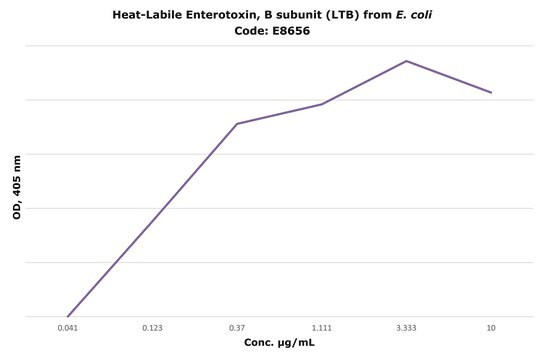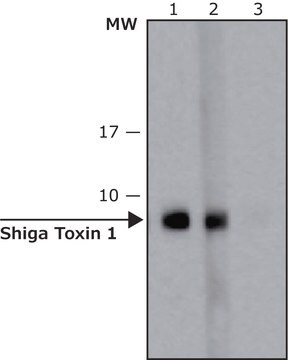SML0562
Shiga Toxin 1, B subunit
recombinant, expressed in E. coli, ≥95% (SDS-PAGE)
Sinônimo(s):
SLT1, STX1, STxB
Faça loginpara ver os preços organizacionais e de contrato
About This Item
Código UNSPSC:
12352200
NACRES:
NA.77
Produtos recomendados
recombinante
expressed in E. coli
Nível de qualidade
Ensaio
≥95% (SDS-PAGE)
Formulário
lyophilized
Condições de expedição
dry ice
temperatura de armazenamento
−20°C
Aplicação
Shiga Toxin 1, B subunit has been used to induce globotriaosylceramide (Gb3) endocytosis.
Ações bioquímicas/fisiológicas
The Shiga toxins are a family of related protein toxins secreted by certain types of bacteria. Shiga toxin (Stx) is produced by Shigella dysenteriae, whereas the Shiga-like toxins, Stx1 and Stx2, with a few known isoforms, are secreted by specific strains of Escherichia coli named Shiga-toxin-producing E. coli (STEC) such as E. coli O157:H7, which causes bloody diarrhea and hemorrhagic colitis in humans, sometimes resulting in fatal systemic complications.
Stx1 is identical to Stx, while the Stx2 isoforms share less sequence similarity with Stx (~60%) and are immunologically distinct. In spite of the differences in their amino acid sequence, all Stx isoforms share the same overall toxin structure and mechanism of action.
Shiga toxins consist of two polypeptides: An A chain and a B chain non-covalently associated with an apparent stoichiometry of one A and five B chains, to form the holotoxin. The catalytic A subunit has a RNA N-glycosidase activity that inhibits eukaryotic protein synthesis. The B subunits form a pentamer that recognizes and binds to the functional cell-surface receptor globotriaosylceramide [Gb3; Gala(1-4)-Galb(1-4)-Glcb1-ceramide]. Gb3 is overexpressed in membranes of numerous tumor cells, therefore STxB binding to Gb3 receptors may be useful for cell-specific vectorization, labeling and imaging purposes.
Stx1 is identical to Stx, while the Stx2 isoforms share less sequence similarity with Stx (~60%) and are immunologically distinct. In spite of the differences in their amino acid sequence, all Stx isoforms share the same overall toxin structure and mechanism of action.
Shiga toxins consist of two polypeptides: An A chain and a B chain non-covalently associated with an apparent stoichiometry of one A and five B chains, to form the holotoxin. The catalytic A subunit has a RNA N-glycosidase activity that inhibits eukaryotic protein synthesis. The B subunits form a pentamer that recognizes and binds to the functional cell-surface receptor globotriaosylceramide [Gb3; Gala(1-4)-Galb(1-4)-Glcb1-ceramide]. Gb3 is overexpressed in membranes of numerous tumor cells, therefore STxB binding to Gb3 receptors may be useful for cell-specific vectorization, labeling and imaging purposes.
forma física
The recombinant product is Shiga toxin 1, B subunit, a 7 kDa protein containing 69 amino acid residues. It is lyophilized from 0.2 μm-filtered solution of phosphate buffer without any carrier protein.
Nota de preparo
Reconstitute the contents of the vial using water to a concentration of 0.1-1.0 mg/mL. This solution can then be further diluted into other aqueous buffers and stored at 2-8 °C for up to 4 months or at −20 °C for extended use.
Nota de análise
Gb3 Binding activity: significant binding above background is achieved with ≤1 μg/mL of STxB. The activity of STxB is measured by its ability to bind to Gb3, which requires its pentameric form.
Código de classe de armazenamento
13 - Non Combustible Solids
Classe de risco de água (WGK)
WGK 3
Ponto de fulgor (°F)
Not applicable
Ponto de fulgor (°C)
Not applicable
Escolha uma das versões mais recentes:
Já possui este produto?
Encontre a documentação dos produtos que você adquiriu recentemente na biblioteca de documentos.
The Pseudomonas aeruginosa lectin LecA triggers host cell signalling by glycosphingolipid-dependent phosphorylation of the adaptor protein CrkII
Zheng S, et al.
Biochimica et Biophysica Acta, 1864(7), 1236-1245 (2017)
In-Sun Shin et al.
Chemical & pharmaceutical bulletin, 54(4), 522-527 (2006-04-06)
A two-step binding assay for globotriaosylceramide (Gb3) content was developed by histidine-tagging strategy, which is a well-established method for the purification of recombinant proteins. The complete binding of the recombinant His-tagged Shiga toxin 1B subunit (1B-His) (1 microg/ml) to the
Nossa equipe de cientistas tem experiência em todas as áreas de pesquisa, incluindo Life Sciences, ciência de materiais, síntese química, cromatografia, química analítica e muitas outras.
Entre em contato com a assistência técnica






